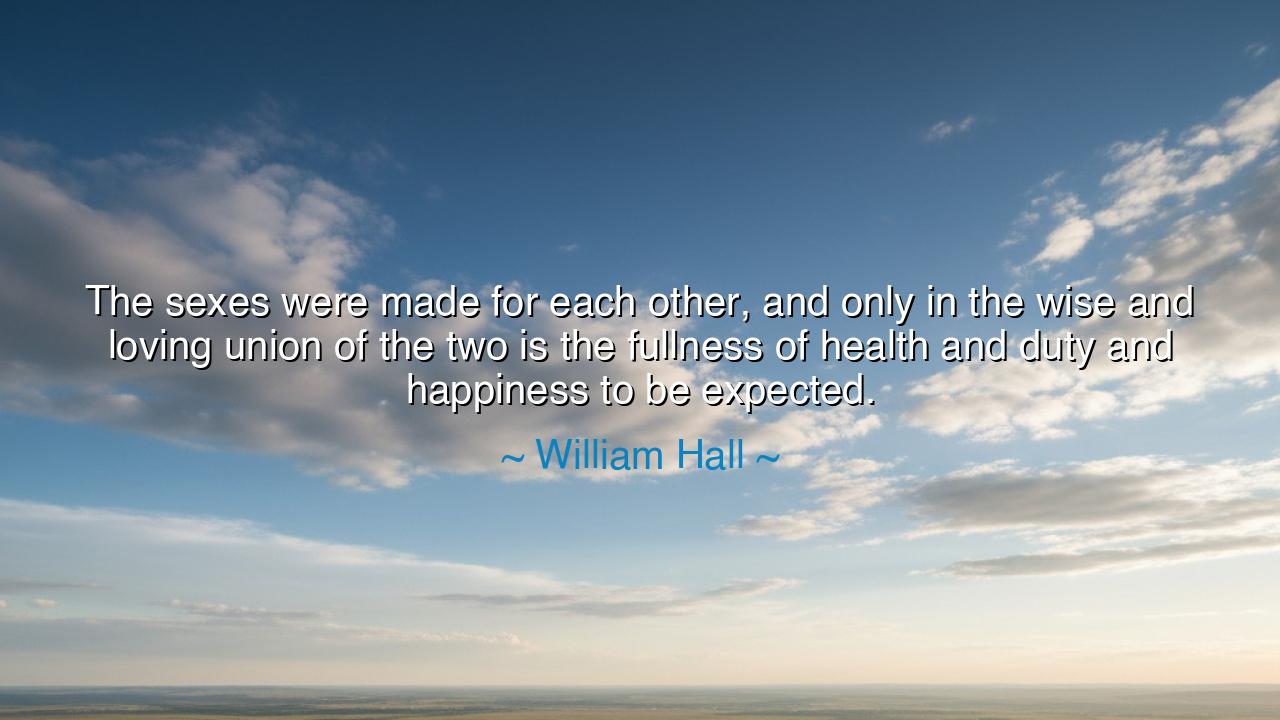
The sexes were made for each other, and only in the wise and
The sexes were made for each other, and only in the wise and loving union of the two is the fullness of health and duty and happiness to be expected.






“The sexes were made for each other, and only in the wise and loving union of the two is the fullness of health and duty and happiness to be expected.” — William Hall
Hear these words of William Hall, spoken in a time when men and women sought to understand not only their nature, but the divine balance written into creation itself. His voice echoes with the harmony of the ancients, for he speaks not of dominance or rivalry, but of union—the sacred joining of two halves meant to complete the whole of human existence. In this saying, Hall reminds us that the sexes are not adversaries, nor mere companions by chance, but counterparts, designed to fulfill in one another what neither can achieve alone.
In every age, the wise have seen that the world itself moves in balance—day and night, sun and moon, fire and water, heart and mind. So too, says Hall, does the balance of man and woman reflect this eternal rhythm. Health, duty, and happiness—these three pillars of a noble life—are not found in isolation, but in the meeting of difference and harmony. The wise and loving union he describes is not limited to marriage or romance alone; it is the larger truth of cooperation between the masculine and the feminine, strength and compassion, will and understanding.
Consider the tale of Odysseus and Penelope, that ancient pair whose love endured through war, distance, and time. Odysseus, the warrior of wit and endurance, faced the storms of the world; Penelope, the steadfast and wise, faced the trials of the home. Yet neither story alone completes the epic. Their strength was one—his action, her constancy; his courage, her patience. Their reunion was more than joy—it was restoration, the return of balance to Ithaca and to the human heart. So too, Hall teaches, do man and woman together form the wholeness of life, for one embodies what the other seeks.
Hall’s vision speaks also to the health of the soul and of society. When the sexes strive not against each other but beside each other, the spirit of humanity flourishes. The duty of man is not to rule woman, nor of woman to submit to man, but for both to uphold the virtues of mutual respect and shared purpose. From such unity springs the greatest happiness—not the fleeting pleasure of desire, but the enduring joy of harmony. It is a union of intellect and emotion, of reason and empathy, in which each nurtures the best of the other.
And yet, his words carry a warning. When the balance between the sexes is broken—when pride replaces partnership, or when fear and suspicion divide what nature has joined—the world itself grows ill. Society loses its center, the family weakens, and the individual soul wanders without compass. Just as the body sickens when its elements fall out of proportion, so too does civilization decay when love and wisdom no longer bind its halves together. Hall, in his quiet wisdom, calls us back to this sacred equilibrium, this wholeness of being that transcends the battles of gender and power.
The ancients understood this truth in symbol. The Chinese spoke of yin and yang, the dark and the light in eternal dance; the Greeks revered Aphrodite and Ares, love and strength entwined. In every culture, the myth of duality endures because it reveals a universal law: that complementarity, not conflict, sustains life. Man and woman, each bearing different gifts, are meant to uplift, not oppose. To honor that difference is not to limit, but to liberate—to allow each to flourish in unity rather than in isolation.
So, my children of the modern world, take heed. Let not the noise of rivalry drown out the melody of partnership. Honor both the masculine and feminine within yourselves and within one another. Seek relationships founded not on power, but on wisdom and love. Remember that in cooperation lies strength, and in understanding lies peace. For as William Hall declared, the fullness of health, duty, and happiness can only blossom when the two great halves of humanity stand as one—each completing, inspiring, and ennobling the other.
In that sacred harmony, life finds its truest song.






AAdministratorAdministrator
Welcome, honored guests. Please leave a comment, we will respond soon